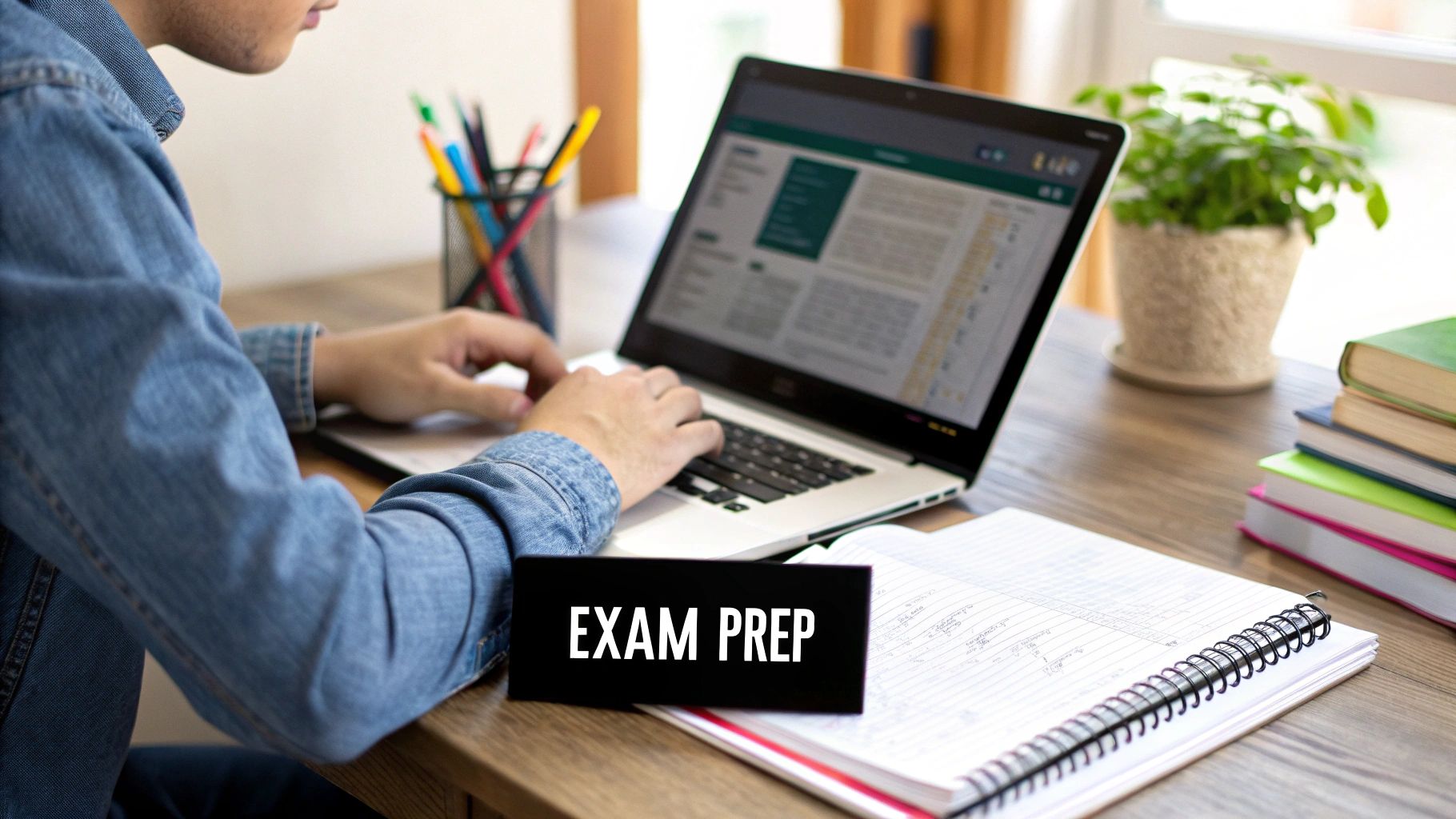California Real Estate License Requirements: How to Get Started
The California Real Estate License Landscape

Before diving into the specifics of getting a real estate license, it's important to understand the overall real estate scene. For a broader look at the field, check out this resource on real estate. California's real estate market is known for being both active and competitive. This means a solid understanding of licensing is essential. The process begins with knowing the difference between the two main license types: Salesperson and Broker.
Each license type has its own function and leads to different career paths within the industry. Understanding these differences is crucial for choosing the right path for you.
Salesperson Vs. Broker License: Understanding the Differences
The Salesperson License is the starting point for most people beginning a career in real estate. Salespersons must work under the supervision of a licensed Broker. While they handle core real estate activities, like listing properties, showing homes, and helping with negotiations, they cannot work independently. This supervised setup gives new Salespersons valuable hands-on experience and mentoring.
Think of a Salesperson like an apprentice learning a trade. They develop practical skills under the guidance of a seasoned professional. A Broker License, on the other hand, signifies a higher level of experience and independence. Brokers can work on their own, establish their own brokerage, and hire Salespersons. This gives Brokers more control over their business and income potential.
The Role of the California Department of Real Estate (DRE)
The California Department of Real Estate (DRE) is a critical player in the real estate world. It regulates the industry, manages licensing, enforces rules, and protects consumers. The DRE has a long history of upholding ethical practices, having regulated real estate licenses since 1917.
As of December 2024, there are approximately 430,554 real estate licensees in California. This substantial number highlights the sheer size of the industry under the DRE's watch. The DRE is tasked with making sure licensees follow the California Real Estate Law and Regulations. This helps maintain fair transactions and builds public trust in the real estate profession.
Mastering the Educational Requirements
Your pre-license education is the cornerstone of your real estate career. It's not just about checking boxes; it's about building a solid foundation. We'll explore the required courses—Real Estate Principles, Real Estate Practice, and an elective—and how to choose programs that deliver true value.
Choosing the Right Courses
The required courses cover the essentials of real estate: concepts, practices, and legal considerations. Real Estate Principles introduces core concepts such as property ownership, valuation, and financing. Real Estate Practice builds upon this foundation, delving into the daily work of an agent, including contracts, disclosures, and client representation. The elective course allows you to specialize in an area like real estate finance or property management. Selecting the right elective can significantly shape your career path.
Finding Reputable Education Providers
The sheer number of real estate education providers can be overwhelming. Look for providers accredited by the California Department of Real Estate (DRE) and those with a proven track record of student success. Consider factors like instructor experience, course delivery methods (online, in-person, or hybrid), and student support. Recommendations from successful agents are also invaluable. Investing in a reputable program sets you up for long-term success.
Learning Styles and Study Strategies
Everyone learns differently. Some thrive in traditional classrooms, while others prefer the flexibility of online learning. Experiment with different study techniques to find what works best for you. This might involve flashcards, practice exams, or study groups. Understanding your learning style and developing effective study habits is crucial for retaining information and passing the exam. Visual learners may benefit from mind maps, while auditory learners might prefer recorded lectures.
To obtain a real estate license in California, you must be at least 18 years old and complete three pre-license courses: Real Estate Principles, Real Estate Practice, and one elective. These courses must be completed within one year of enrollment, with a minimum of 18 days dedicated to each. The DRE emphasizes honesty and truthfulness in the application process, and a criminal conviction could lead to license denial. Out-of-state residents must also complete a Consent to Service of Process Form (RE 234). Historically, the California real estate exam pass rates have been challenging, with broker examinees averaging between 42-45% and salesperson examinees between 49-60%. Find more detailed statistics here.
Building a Study Schedule
Balancing work, family, and other commitments with your studies requires a well-structured study schedule. Create a realistic plan that aligns with your daily routine and allows for consistent progress. Break down the course material into manageable sections and set specific study times. Consistency is key. Remember to incorporate flexibility for unexpected events. A dedicated study space free from distractions can also boost focus and learning efficiency.

The following table provides a comparison of the pre-licensing courses required for salesperson and broker licenses in California. This overview will help you understand the educational commitment involved in pursuing each license type.
California Real Estate Pre-License Course Requirements
| License Type | Required Courses | Total Hours | Completion Timeframe |
|---|---|---|---|
| Salesperson | Real Estate Principles, Real Estate Practice, One Elective | 135 | 1 Year |
| Broker | Real Estate Practice, Legal Aspects of Real Estate, Real Estate Finance, Real Estate Appraisal, One Elective | 270 | 1 Year |
This table highlights the significant difference in required coursework between the salesperson and broker licenses. While both require core courses and an elective, the broker license demands substantially more education, reflecting the increased responsibility and expertise associated with this role.
Conquering the California Real Estate Exam

The California real estate exam is a significant step towards becoming a licensed agent. But with proper preparation, you can boost your chances of passing on your first attempt. This section moves beyond general study tips and explores proven strategies for exam success.
Understanding the Exam Structure
The California real estate exam assesses your understanding of national and state-specific real estate principles, practices, and laws. The salesperson exam has 150 multiple-choice questions, while the broker exam includes 200 questions. You have 3 hours and 15 minutes for the salesperson exam and 5 hours for the broker exam. Understanding this structure is crucial for allocating your study time effectively.
Strategic Approaches to Challenging Content Areas
Some exam topics are known to be more difficult than others. These often include real estate finance, contracts, and California-specific regulations. Prioritize these areas in your study plan.
One effective method is using practice questions and simulated exams. This helps identify your weak points and focus your efforts accordingly. For example, if loan amortization calculations are a struggle, dedicate extra time to practicing those problems.
Decoding DRE Question Patterns
Recognizing how the California Department of Real Estate (DRE) structures its exam questions can give you a considerable advantage. The DRE often uses particular wording and phrasing patterns.
Familiarizing yourself with these patterns through practice exams can help you anticipate the correct answers. This means that understanding the question's structure can often guide you, even when the topic is complex.
Managing Exam Anxiety
Exam anxiety can affect even the most well-prepared individuals. Develop strategies to manage stress and stay focused during the exam. Deep breathing exercises, mindfulness techniques, and positive self-talk can be beneficial.
Also, getting a good night's sleep before the exam and arriving at the testing center early can help reduce anxiety. A calm and focused mind is key to recalling information and applying it effectively.
Navigating the License Application Process

Passing the California real estate exam is a huge achievement. But the path to becoming a licensed agent doesn't stop there. The application process can be tricky, so understanding each step is essential for a smooth transition into your new career. Taking this careful approach can prevent delays and frustration.
Submitting Your Application to the California DRE
The application process requires a complete package sent to the California Department of Real Estate (DRE). This package typically includes your exam results, application fees, and background check information. Double-checking every detail is crucial to avoid rejections or delays. The DRE plays a vital role in protecting the public by upholding the Real Estate Law. It ensures all licensees meet strict requirements, like completing pre-licensure courses and passing the state exam. Accuracy and completeness are key to a successful application.
The Fingerprinting Process: Avoiding Common Delays
Fingerprinting is a mandatory part of the application. Surprisingly, scheduling delays or problems submitting fingerprints are common obstacles. To avoid these, schedule your fingerprinting appointment early. Also, confirm your fingerprints are taken at an approved location and submitted properly. A little planning can prevent significant setbacks.
Understanding Supporting Documentation
Your application needs specific supporting documents, such as proof of education and identification. Gathering these materials in advance streamlines the entire process. For instance, make sure you have official transcripts from your pre-licensing courses readily available. This preparation can significantly reduce processing time.
Communicating Effectively With the DRE
Even with careful preparation, questions might come up during the application process. Knowing how to communicate effectively with the DRE is essential. Keep detailed records of all interactions and proactively address any information requests. This can help resolve issues quickly.
Special Circumstances: Addressing Potential Red Flags
Applicants with previous legal issues or out-of-state licenses may face extra scrutiny. Addressing these circumstances proactively is critical. Provide the DRE with all required documentation upfront, along with a clear explanation. Honesty and transparency are essential for navigating these situations. By being proactive, you demonstrate professionalism and build trust with the DRE, which can expedite the review.
Financial Planning for Your Licensing Journey
Becoming a licensed real estate agent in California is a significant step, requiring not only dedication and hard work but also a sound financial plan. Understanding the associated costs is paramount to a smooth transition into your real estate career. Financial preparedness can be the key to a successful launch, while a lack of planning can lead to unforeseen obstacles. This section provides a comprehensive overview of the expenses you should anticipate.
Budgeting for Pre-Licensing Education
Your pre-licensing education is the first financial commitment. Costs can fluctuate based on the chosen education provider and the course delivery format (online or in-person). While opting for the most affordable option might seem appealing, remember that investing in quality education is crucial for your long-term success. Include expenses for textbooks, supplementary study materials, and exam preparation resources in your budget. A realistic budget for this phase sets the foundation for your overall financial planning.
Exam Fees and Associated Costs
After completing your pre-licensing coursework, you'll face the California real estate exam. The exam carries a fee, and it's wise to account for potential retake fees should you not pass on the first attempt. Practice exams, although an additional cost, are highly recommended and contribute significantly to your preparedness. These seemingly minor expenses can accumulate, so it's prudent to include them in your budget from the outset.
Application and Licensing Fees
Passing the exam is a significant accomplishment, but the journey continues with submitting your application to the California Department of Real Estate (DRE). This entails an application fee, along with additional costs for fingerprinting and background checks. These are mandatory requirements for licensure in California, so ensure they are incorporated into your financial plan. Careful budgeting ensures a smooth and efficient application process.
Post-Licensing Expenses: Ongoing Costs to Consider
Securing your license is a milestone, but it's also the beginning of ongoing financial responsibilities. These include license renewal fees, Errors and Omissions (E&O) insurance, and continuing education requirements. Depending on your business model, you might also incur expenses related to marketing, office space, and technology. These costs can vary widely, making research and planning essential.
Smart Financial Strategies for Your Licensing Journey
Effectively managing your finances throughout the licensing process is crucial. Staggering your investments is a smart strategy. For instance, complete your pre-licensing education, then save for the exam fees before commencing exam preparation. This approach prevents feeling financially overwhelmed. Prioritizing essential expenses is equally important. Avoid unnecessary spending on non-essential marketing or premium resources that may not offer a substantial return. Focus on the core requirements and invest wisely in resources that directly contribute to your licensing success.
To help you plan, let's look at a breakdown of the typical costs associated with getting and maintaining your real estate license in California:
California Real Estate License Cost Breakdown
| Expense Category | Salesperson Cost | Broker Cost | Renewal Frequency |
|---|---|---|---|
| Pre-Licensing Education | $300 – $600 | $500 – $1,000 | N/A |
| Exam Fee | $60 | $95 | N/A |
| License Application Fee | $245 | $300 | Every 4 years |
| Fingerprinting | $49 | $49 | N/A |
| Background Check | $10 – $30 | $10 – $30 | N/A |
| Continuing Education | Varies | Varies | Every 4 years |
| E&O Insurance | Varies | Varies | Annually |
This table provides a clear overview of the range of expenses you can expect. Understanding these costs upfront and employing strategic financial planning will enable you to confidently navigate the licensing process and build a successful real estate career.
Building Your Career After Getting Licensed
Earning your California real estate license is a big accomplishment, but it’s really just the beginning. The choices you make after getting licensed will have a major impact on your future success. This section explores how successful agents set themselves apart early on, building a strong foundation for thriving careers.
Choosing the Right Brokerage
Picking your first brokerage is a crucial decision that involves more than just commission splits. Think about the brokerage's culture, training programs, and the resources they offer. A supportive environment with mentoring can be incredibly valuable for new agents. Does the brokerage focus on a specific area of the market that interests you? Some brokerages provide advanced tech platforms and marketing assistance, giving you a real edge in a competitive market.
Essential Skills Beyond Licensing Requirements
California's real estate licensing requirements teach you the basics, but real-world experience is where you'll truly develop your skills. Concentrate on building crucial skills like effective communication, strong negotiation tactics, and excellent client relationship management. You’ll hone these skills through practice and interaction. Shadowing seasoned agents or attending negotiation workshops can offer priceless insights. After getting your license, explore different ways to market yourself and your properties with these real estate marketing strategies.
Setting Up Business Systems
Even before you close your first deal, set up efficient business systems. This includes a client relationship management (CRM) system like Salesforce, transaction management software, and a solid accounting process. Having these systems in place from the start will help things run smoothly as your business expands. This proactive approach lets you concentrate on your clients’ needs instead of scrambling to get organized.
Continuing Education and Professional Development
Learning doesn't stop once you're licensed. Continuing education isn't just required for license renewal—it's a valuable chance to expand your knowledge and stay ahead of the curve. Look for courses and workshops covering current market trends and new technologies. Also, consider pursuing specialized designations like Certified Residential Specialist (CRS) or Accredited Buyer's Representative (ABR) to boost your credibility and attract specific clients. These designations showcase expertise in certain areas and can be a powerful marketing asset.
Tracking Your Progress and Setting Goals
Successful agents actively manage their professional development. Establish clear, measurable goals, whether it’s closing a certain number of transactions, reaching a specific income level, or developing a niche market. Regularly check your progress and adjust your approach as needed. This continuous self-assessment is essential for constant improvement and long-term success. It ensures you're always moving forward and adapting to the ever-changing real estate market. For new agents, this might mean setting goals for the first six months, such as securing a set number of listings or building a network of referral partners.
Ready to boost your real estate career with a supportive brokerage, zero broker splits, and a focus on agent growth? Visit Ashby Graff Careers today to find out more and begin your application.






